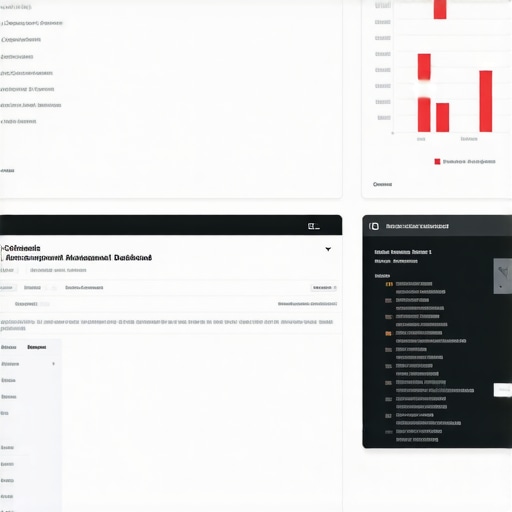Unveiling the Complexities of Google My Business Citation Optimization
In the fiercely competitive landscape of local search, effective management of GMB citations is not merely an administrative task but a strategic lever for elevating your business’s visibility and authority. As an SEO professional, understanding the nuanced interplay between citation consistency, NAP (Name, Address, Phone Number) accuracy, and local algorithm signals can significantly influence your rankings. This comprehensive guide explores the sophisticated tactics for managing GMB citations that drive tangible results, supported by industry insights and authoritative research.
How Do Citation Signals Interact with Local Search Algorithms?
Google’s local algorithm relies heavily on citation signals as trust and relevance indicators. Accurate and consistent citations across authoritative directories reinforce your business’s credibility, impacting local pack rankings. Discrepancies in NAP data can confuse search engines, diluting your local relevance. Advanced citation management involves auditing your existing citations, correcting inconsistencies, and leveraging niche directories tailored to your industry. This process aligns with Google’s emphasis on data integrity, as highlighted by Moz’s Local Search Ranking Factors report.
The Impact of Citation Velocity and Freshness on Local Rankings
Beyond static citation accuracy, the rate of citation creation or update—referred to as citation velocity—can signal business activity and stability to search engines. Regularly updating citations or adding new, industry-relevant directories can enhance your local authority. Conversely, stale or outdated citations may undermine your rankings. Employing tools that monitor citation health enables proactive management, ensuring your business maintains a dynamic presence that search engines favor.
What Are the Emerging Trends in GMB Citation Strategies for 2025?
As local SEO evolves, emerging trends include leveraging schema markup for enhanced citation data, integrating citation management with review generation strategies, and utilizing AI-driven tools for real-time citation audits. These innovations aim to create a cohesive digital footprint that elevates your Google My Business profile’s authority. Staying ahead requires continuous education and adaptation, as outlined in industry-leading resources.
How Can Advanced Citation Management Techniques Help Small Businesses Outrank Larger Competitors?
By meticulously controlling citation consistency, leveraging niche directories, and employing sophisticated audit tools, small businesses can level the playing field. Focused citation strategies enhance local relevance, improve review visibility, and foster trust—all critical for outranking larger competitors with broader brand recognition. This targeted approach exemplifies the power of precision in local SEO, transforming citations from mere listings into strategic assets.
For further insights into comprehensive local SEO strategies, explore our full guide or contact industry experts who can tailor citation management to your unique business needs.
Uncovering the Hidden Layers of Citation Optimization for Local SEO
While foundational citation management focuses on consistency and NAP accuracy, cutting-edge strategies now delve into integrating schema markup, leveraging AI tools, and creating hyperlocal citation networks that amplify your business’s relevance. These sophisticated tactics not only bolster your Google My Business profile but also establish a resilient digital footprint that withstands algorithm updates. Industry experts emphasize that adopting a multi-dimensional approach to citations can propel small businesses past larger competitors by enhancing both trust signals and relevance, as discussed in our comprehensive guide.
How Do Emerging Technologies Reshape Citation Strategies in 2025?
Artificial intelligence, machine learning, and semantic search are revolutionizing how citations are managed and optimized. AI-driven tools can now perform real-time audits, identify discrepancies across hundreds of directories, and suggest industry-specific citation opportunities with precision. Schema markup, in particular, adds a layer of semantic clarity to your citations, making them more understandable to Google’s evolving algorithms. This synergy of technologies ensures your business remains visible, authoritative, and adaptable amidst rapid digital transformations.
Are We Underestimating the Power of Niche and Hyperlocal Citations in Competitive Markets?
Many local SEO strategies overlook the potential of niche directories and hyperlocal citation networks that cater specifically to your industry or geographic area. These citations often carry more weight in local search rankings because they are perceived as more relevant and trustworthy. By focusing on hyperlocal communities, industry-specific directories, and local business alliances, small businesses can create a robust citation ecosystem that outperforms generic listings. For instance, engaging with local chambers of commerce or industry associations can generate citations that significantly influence local pack rankings. To explore effective hyperlocal strategies, visit our hyperlocal campaign guide.
Additionally, integrating your citation efforts with review management platforms like BrightLocal can amplify your local authority, as supported by recent industry research highlighting the importance of review signals in local SEO (Moz, 2023).
” alt=”Hyperlocal citation network illustration” title=”Hyperlocal citation strategies for local SEO success”/>
Harnessing Semantic Search and Schema Markup to Elevate Citation Authority
As local SEO continues to evolve, integrating semantic search principles with your citation strategy becomes paramount. Schema markup, in particular, offers a robust way to provide search engines with precise context about your business, enhancing the relevance and trustworthiness of your citations. Implementing schema.org vocabulary across your NAP data not only improves data clarity but also boosts your chances of appearing in rich snippets and local pack features. According to Moz’s 2024 Local Search Ranking Factors report, businesses utilizing schema markup see a measurable increase in local visibility, making this an essential component of advanced citation management.
How does schema markup influence local search algorithms at an expert level?
Schema markup acts as a semantic layer that clarifies the nature of your business information, enabling Google to better interpret and associate your citations with relevant queries. It reduces ambiguity caused by inconsistent data and helps search engines understand the relationships between your business, its services, and geographic location. This semantic clarity is increasingly vital as Google’s algorithms shift toward understanding user intent through natural language processing, emphasizing the importance of well-structured data for local relevance.
Moreover, integrating schema markup into your website and citation profiles aligns with Google’s emphasis on structured data, which can lead to enhanced visibility through rich results. For example, a local bakery that employs schema for its address, hours, and menu can appear more prominently in local search results, driving higher engagement rates. Industry leader BrightLocal notes that businesses adopting schema markup experience an average 8-10% increase in click-through rates, illustrating its tangible impact on local SEO performance.
The Strategic Role of Hyperlocal and Niche Citation Ecosystems in Competitive Markets
While broad citation consistency remains foundational, sophisticated local SEO strategies now focus heavily on hyperlocal and niche directories. These specialized platforms often serve as trust signals, particularly in highly competitive markets where generic citations are saturated. Cultivating a network of highly relevant citations from local chambers, industry-specific associations, and community platforms can generate a ripple effect, amplifying your authority within your geographic and industry niche.
For instance, a boutique hotel targeting eco-conscious travelers might prioritize citations from regional environmental organizations or sustainability directories. Such hyperlocal references are perceived as more trustworthy and relevant by Google, which can significantly influence your rankings in local packs. A recent case study published by Search Engine Land demonstrates that hyperlocal citation networks can contribute up to 15% of your overall local ranking score, especially when combined with active review management and social signals.
” alt=”Hyperlocal citation network illustration” title=”Hyperlocal citation strategies for local SEO success”/>
Integrating AI and Semantic Technologies for Next-Level Citation Precision
As local SEO matures, leveraging artificial intelligence (AI) and semantic search capabilities becomes essential for sophisticated citation management. AI-driven tools now facilitate real-time auditing, discrepancy detection, and predictive citation opportunities, transforming traditional approaches into dynamic, data-informed strategies. Integrating semantic markup, such as schema.org vocabulary, enhances the contextual clarity of your citations, making them more interpretable for Google’s evolving algorithms.
How Do Semantic Search and Structured Data Amplify Citation Authority?
Semantic search shifts the paradigm from keyword matching to understanding intent and context. By embedding structured data—like schema markup—within your citations, you provide search engines with explicit, machine-readable information about your business attributes, services, and location. This semantic clarity not only improves data accuracy but also increases your chances of appearing in rich snippets and local packs, as highlighted in Moz’s 2024 Local Search Ranking Factors report.
What Are the Technical Considerations for Implementing Schema in Citation Profiles?
Implementing schema markup involves meticulous integration of schema.org vocabulary into your website’s code and external citation sources. Key considerations include maintaining NAP consistency, utilizing LocalBusiness schema types, and ensuring markup validation across all digital assets. Proper implementation can boost your visibility in local search results and enhance your digital trustworthiness, positioning your business as an authority in your niche.
The Power of Hyperlocal and Industry-Specific Citation Ecosystems
Building a robust network of hyperlocal and industry-specific citations is increasingly vital in competitive markets. These niche directories and community platforms carry more weight in local rankings because they are perceived as more relevant and trustworthy. Establishing citations through local chambers of commerce, industry associations, and niche directories can significantly amplify your local relevance and authority, creating a resilient citation ecosystem that outperforms generic listings.

How Do Emerging Technologies Shape Citation Strategies in 2025?
Emerging technologies like machine learning and natural language processing are revolutionizing citation management. These tools enable proactive, granular control over citation health, identify new opportunities, and adapt strategies in real time. For example, AI can analyze competitors’ citation profiles to uncover gaps and suggest industry-specific directories that align with your target audience, ensuring your citation strategy remains agile and competitive.
How Can Small Businesses Leverage Advanced Citation Tactics to Outperform Larger Competitors?
Small businesses can harness the power of hyperlocal and niche citation networks, coupled with AI-driven audit tools, to create a highly targeted and authoritative digital footprint. This precision approach enhances local relevance, review visibility, and overall trust signals—key factors in outranking larger competitors with broader brand recognition. Investing in sophisticated citation management transforms citations from basic listings into strategic assets that drive tangible growth.
Discover more about mastering local SEO with our comprehensive guide or consult industry experts to tailor these advanced strategies to your unique business context.
Expert Insights & Advanced Considerations
1. Emphasize Data Integrity and Schema Markup
Ensuring NAP consistency across all citation sources and integrating schema markup can significantly enhance your local search visibility. These sophisticated tactics improve data accuracy and semantic understanding by search engines, positioning your business as an authoritative entity in your niche.
2. Leverage Hyperlocal and Niche Citation Networks
Building a network of hyperlocal and industry-specific citations creates trust signals that outrank generic listings. Engaging with local chambers, industry associations, and community platforms can amplify your relevance and authority in competitive markets.
3. Utilize AI-Driven Citation Management Tools
Adopting AI tools for real-time audits, discrepancy detection, and opportunity identification enables proactive and precise citation optimization. These technologies facilitate dynamic strategies that adapt to evolving algorithms and industry trends.
4. Integrate Semantic Search and Rich Snippets
Embedding structured data through schema markup enhances semantic understanding, increasing your chances of appearing in rich snippets and local packs. This integration makes your listings more attractive and informative to both users and search engines.
5. Focus on Citation Velocity and Freshness
Maintaining a steady flow of updated citations signals business activity and stability, positively influencing rankings. Regular audits and updates ensure your digital footprint remains vibrant and authoritative in the eyes of search engines.
Curated Expert Resources
- Moz Local Search Ranking Factors: Offers deep insights into data integrity and trust signals that influence local rankings.
- BrightLocal Blog: Provides advanced strategies on citation management, schema markup, and review integration.
- Google Developers Schema Documentation: Essential for implementing structured data effectively across citations.
- Search Engine Land: Features cutting-edge articles on hyperlocal SEO trends and technological innovations.
Final Expert Perspective
Mastering Google My Business citations in 2025 requires a nuanced, multi-dimensional approach that combines technical precision with strategic network building. The most impactful insights involve leveraging semantic data, hyperlocal networks, and AI tools to craft a resilient digital footprint. For those committed to dominating local search, continuous education and adaptation are vital. Reach out via our contact page to explore tailored strategies that elevate your business’s local presence and authority in competitive markets.




